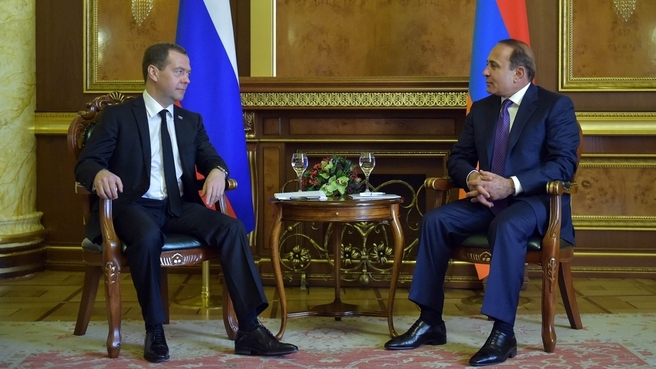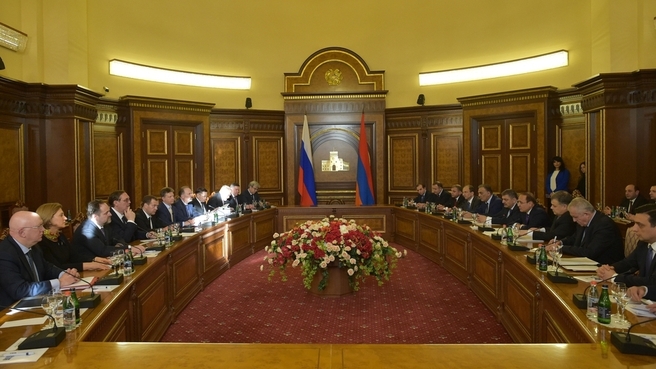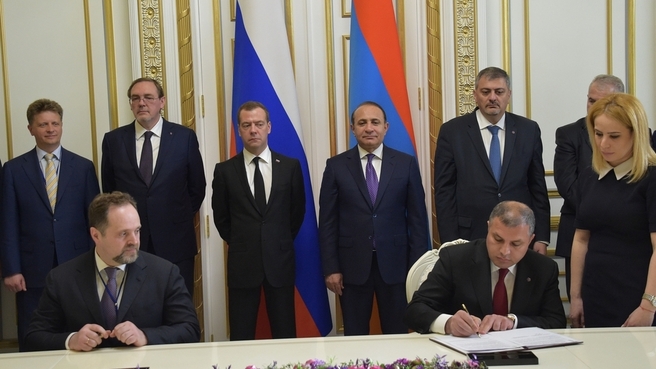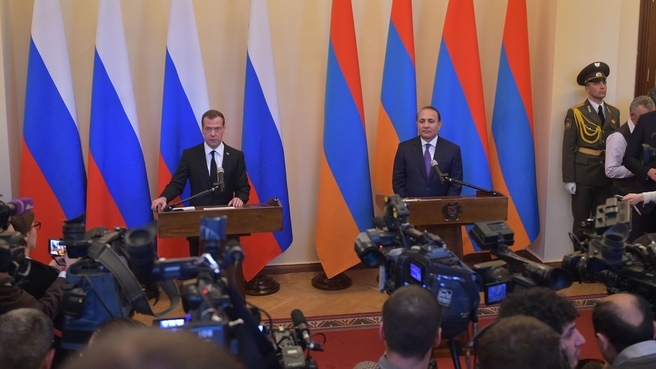Dmitry Medvedev held talks with Prime Minister of Armenia Hovik Abrahamyan.
Meeting with Armenian Prime Minister Hovik Abrahamyan
Documents signed following the talks
Meeting with Armenian Prime Minister Hovik Abrahamyan
Transcript of the beginning of the meeting:
Hovik Abrahamyan: Welcome on behalf of the Armenian Government. I’m very glad we’re having this meeting. I’m sure your official visit will give us an opportunity to discuss the economic issues on our agenda. Welcome again. I’m happy to see you.
Dmitry Medvedev: Mr Abrahamyan, it’s a pleasure to be here. I’m glad that, as agreed, we will discuss all aspects of Russian-Armenian cooperation and relations between our countries, including economic and humanitarian issues.Certainly, we will focus on topical issues, including the most urgent ones, that is the issues of war and peace, and settlement in the conflict area. As planned, we will finish by signing some important documents which I hope are essential for your country and which we have worked on together and consulted over the phone recently. Thank you very much for your hospitality and for the wonderful weather.
Hovik Abrahamyan: It’s a pleasure, Mr Medvedev.
<…>
Russian-Armenian talks in expanded format
Transcript of the beginning of the talks:
Hovik Abrahamyan: Mr Medvedev, I’m sincerely glad to greet you on behalf of the Government of the Republic of Armenia. First of all, I’d like to thank you for accepting my invitation to pay an official visit to Armenia. It will offer a good opportunity to discuss a broad range of issues – both bilateral ones and multilateral integrated cooperation within the Eurasian Economic Union.
I must admit that at the last moment the Chair of the Eurasian Intergovernmental Council suggested postponing the council meeting scheduled to take place in Yerevan on 8 April without any serious grounds. I must emphasise that we consider this style of work unacceptable.
As for our relations, we hope that today’s talks will produce important agreements that could substantially promote our bilateral cooperation. We are consistently developing Armenian-Russian strategic cooperation in the political, military-technical, energy and cultural areas. In the past year and a half, our countries signed almost 30 interstate, intergovernmental, interdepartmental and interregional documents.
The fourth Armenian-Russian interregional forum was held with success last November. We intend to continue strengthening and developing our strategic alliance with the Russian Federation. The Armenian Government is ready to implement these tasks and step up trade and economic relations, factoring in the operation of the EAEU.
As for the Nagorno-Karabakh conflict, as you know, on the night of 1-2 April the Azerbaijani side began large-scale military actions under a previously adopted plan, using the entire range of its weapons, including T-90 tanks, Smerch multiple launch rocket systems , TOS-1A heavy flamethrowers and the air force. Weapons were repeatedly used against civilians. Such actions have not been undertaken since the ceasefire of 1994. The mutual agreement on keeping up the ceasefire has been valid since noon of 5 April, but the Azerbaijani side periodically violates it, firing from large-calibre weapons and using reconnaissance and subversive groups. As one of the parties of the 1994 Ceasefire Agreement, the Republic of Armenia will continue fully abiding by its commitments on ensuring the security of the Nagorno-Karabakh population. We attach much importance to upholding the ceasefire.
Mr Medvedev, we are grateful to the Russian side for granting Armenia a government export loan to pay for arms supplies. However, there are some delays in carrying out the provisions of the relevant agreement. Therefore, I’d like to ask you to instruct Rosoboronexport to speed up the signing of contracts as much as possible. Thank you.
Dmitry Medvedev: Thank you. Mr Abrahamyan, our Armenian friends, colleagues,
We are pleased to be here. We have been planning an official visit of the governmental delegation for a long time now. It reinforces our alliance, which is steeped in rich history. A lot of work went into preparing this visit, and we hope we will take the decisions that we planned in a number of spheres. We have put together several documents for signing, which deal with the use of outer space, housing and utilities services, environmental protection, medical and sanitary monitoring, and region-to-region cooperation. We have just reached an agreement on gas. I hope these decisions will help Armenia grow its economy, and we will continue to consolidate our strategic partnership.
You mentioned the intergovernmental council meeting of heads of government of the Eurasian Economic Union, which failed to be held in Yerevan this week. Indeed, it was rescheduled, since our partners asked us to do so. I understand that the Armenian side was making preparations for this meeting, and a sudden change of plans never makes anyone feel any better. Nevertheless, I believe that we, first, can still discuss the key issues at a meeting in Moscow, if you accept our invitation, all the more so since the last time we had such a meeting was six months ago, and we now have things to discuss.
Second, with regard to the issue that we have just discussed, I think it would be right to hold our next meeting without any delay (we agreed to meet more often, once a month or every other month) in Yerevan, as agreed.
The reasons for rescheduling are also quite understandable, because what happened creates, of course, a rather complex situation, and this is part of the reason I came to see you. Some of the issues that I plan to discuss with you and the President of the Republic of Armenia concern the settlement and the continuation of the dialogue.
At some point, we put in a lot of effort to kick start this dialogue. Indeed, what has happened is unprecedented since 1994. That is what motivates us to look for possible solutions focusing on the preservation of peace and agreements that were reached, including through mediation of the Russian Federation.
We will discuss all of that, because it’s a complex issue.
<…>
The following documents were signed at the conclusions of the talks in the presence of Dmitry Medvedev and Hovik Abrahamyan:
- Agreement between the Government of the Russian Federation and the Government of the Republic of Armenia on Cooperation in Civilian Space Exploration
Signed by: Igor Komarov, Director General of the Roscosmos State Corporationfor Space Activities, and Minister of Transport and Communications of the Republic of Armenia Gagik Beglaryan
- Agreement between the Ministry of Construction, Housing and Utilities of the Russian Federation and the Ministry of Urban Development of the Republic of Armenia on Cooperation in Urban Development, Architecture, Construction, Housing Policy and the Housing/Utilities Infrastructure
Signed by: Minister of Construction, Housing and Utilities Mikhail Men and Minister of Urban Development of the Republic of Armenia Narek Sargsyan
- Agreement between the Russian Federal Service for the Oversight of Consumer Protection and Welfare and the Ministry of Healthcare of the Republic of Armenia on Cooperation in Implementing the International Health Regulations (2005)
Signed by: Anna Popova, Head of the Federal Service for the Oversight of Consumer Protection and Welfare, and Minister of Healthcare of the Republic of Armenia Armen Muradyan
- Memorandum on Cooperation in Environmental Protection between the Ministry of Natural Resources and Environment of the Russian Federation and the Ministry of Nature Protection of the Republic of Armenia
Signed by: Minister of Natural Resources and Environment Sergei Donskoi and Minister of Nature Protection of the Republic of Armenia Aramayis Grigoryan
- Memorandum of Understanding and Cooperation between the Ministry of Economic Development of the Russian Federation and the Ministry of Economy of the Republic of Armenia
Signed by: First Deputy Minister of Economic Development Alexei Likhachov and Minister of Economy of the Republic of Armenia Artsvik Minasyan
- Agreement between the Government of the Vologda Region (Russian Federation) and the Administration of the Armavir Region (Republic of Armenia) on Trade, Economic, Science, Technological and Cultural Cooperation
Signed by: Vologda Region Governor Oleg Kuvshinnikov and Armavir Region Governor Ashot Kagramanyan
- Cooperation Agreement between the Russian Agency for Export Credit and Investment Insurance and the Export Insurance Agency of Armenia
Signed by: Alexei Tyupanov, Director General of the Russian Agency for Export Credit and Investment Insurance, and Vazgen Abgaryan, Executive Director of the Export Insurance Agency of Armenia
- An addendum to Contract No 02-13-04 between Gazprom Export and Gazprom Armenia for the Delivery of Natural Gas to the Republic of Armenia in 2014-2018 of 2 December 2013
Signed by: Gazprom Board Chairman Alexei Miller and Gazprom Armenia Board Chairman-Director General Vardan Arutyunyan
- A protocol on amending the Agreement between the Government of the Russian Federation and the Government of the Republic of Armenia on Pricing Policies during the Delivery of Natural Gas to the Republic of Armenia of 2 December 2013
Signed by: Deputy Minister of Energy Anatoly Yanovsky and Minister of Energy and Natural Resources of the Republic of Armenia Levon Yolyan
- A protocol on amending the Agreement between the Government of the Russian Federation and the Government of the Republic of Armenia on the Terms for Selling/ Buying Shares and the Future Activities of ArmRosGazprom of 2 December 2013
Signed by: Deputy Minister of Energy Anatoly Yanovsky and Minister of Energy and Natural Resources of the Republic of Armenia Levon Yolyan
Hovik Abrahamyan and Dmitry Medvedev’s statements for the press upon the completion of the Russian-Armenian talks
Transcript:
Hovik Abrahamyan (via interpreter): I’d like to welcome again Prime Minister Dmitry Medvedev and the delegation he heads on the arrival for an official visit to Armenia.
We’ve just completed the meeting with Mr Medvedev that took place in a very warm and friendly atmosphere.
We discussed both bilateral allied cooperation and joint integration efforts in the EAEU, and set forth the main areas and goals of our partnership in the near future.
We noted the importance of upholding the ceasefire on the contact line between Nagorno-Karabakh and Azerbaijan and of consolidating the 1994 truce. The problem should be resolved only through peaceful talks and under the aegis of the OSCE Minsk Group.
We also discussed a broad range of issues of mutual interest in cooperation in the economy, energy, transport, agriculture, tourism, humanitarian issues, education, culture and legislation that was supplemented today with newly signed documents.
We discussed in detail the reduction of the price on the natural gas supplied to Armenia and sealed our agreement by signing relevant documents.
We emphasised the importance of the role of the Armenian-Russian Intergovernmental Commission on Economic Cooperation and the need for its regular sessions, which is one of the best ways of developing mutually beneficial trade and economic relations between the two countries.
We both also stressed the importance of failsafe operation of the Upper Lars border checkpoint.
Summing up the above, I’d like to note that as always the talks took place in the atmosphere of mutual understanding and constructive attitude. I’m convinced that the reached agreements that pursue practical purposes will be successfully carried out. Now I’d like to give the floor to Russian Prime Minister Dmitry Medvedev. Mr Medvedev, go ahead please.
Dmitry Medvedev: Thank you. Good afternoon. First of all, I’d like to say that we have just completed talks with my colleague, Prime Minister of Armenia Hovik Abrahamyan.
As always our meeting took place in a friendly and warm atmosphere that is inherent in our relations. We discussed all issues of our bilateral cooperation and prospects for further enhancing Eurasian integration. Nothing should interfere with this, even the decisions to reschedule some or other meetings. We agreed that we will continue meeting and discussing everything in this vein.
Russian-Armenian trade and economic ties were the main topic at our talks. Despite unfavourable global economic environment, our cooperation is fairly dynamic. Russia remains Armenia’s leading foreign trade partner.
Our trade is over $1.25 billion. It decreased a bit but this reduction occurred because of price fluctuations on mutually supplied products. This is not a reduction in the volume and this is probably the main point.
The total Russian capital investment also remains the same – about $4 billion. Some 1,300 companies with Russian capital operate in Armenia. We think these are very positive facts but certainly not the limit.
We have just signed the documents about which my colleague spoke, on developing cooperation in space exploration for peaceful purposes, housing and utilities, urban development, environmental protection, and medical and sanitary monitoring. We also signed agreements on interregional cooperation and energy issues, such as gas supplies that are vital for Armenia’s stable energy consumption and steady development.
We have started carrying out the programme on extending the operation of the Armenian Nuclear Power Plant. This is a unique project and usually such projects last for a long time but we hope to implement it in five years.
On 1 February, the new Eurasian Economic Commission board started to work. Over the next four years, it will be chaired by a representative of Armenia. We all know that it is Tigran Sargsyan, former prime minister. Despite the challenging external economic situation, we must fully discover the integration potential of the Eurasian Economic Union, which we also discussed. We agreed that we will conduct corresponding activities, factoring in the decisions that have been taken to transfer the next-week meeting to Moscow. Later, we will, of course, hold corresponding meetings (in the short term, a meeting of heads of governments of the Eurasian Economic Union) in Armenia, as agreed.
Of course, we are united not only by economic and trade cooperation, but also our cultural, historical, and humanitarian relations. We are pleased that Armenia supports the Russian language, which really binds our countries. We would like to see this kind of relations continue into the future. We have agreed to further strengthen humanitarian and cultural cooperation in the already existing areas, such as youth and educational exchanges, and the work of universities.
We also discussed another issue that concerns the proposals of our Armenian partners to use internal Russian passports for travelling to Armenia. This initiative is indicative of a special nature of relations between our nations. We are willing to implement this initiative.
Of course, we discussed the situation surrounding Nagorno-Karabakh. I discussed it with the prime minister, and plan to discuss it with the president tonight. The situation causes our deep concern. I hope that the ceasefire will be maintained and the political process will resume. Much was invested in this process to make sure that diplomats, rather than military, deal with the settlement, to prevent further casualties and destruction. Russia is willing to continue to act as a mediator in the Minsk Group, and to use its clout as part of the relevant procedures. There’s no alternative to existing mechanism. Its powers have been enshrined in the UN Security Council and the OSCE resolutions. Most importantly, I would like to emphasise it again, it is imperative to prevent the conflict from slipping into the hot phase, as it can have the most tragic implications for the region. We will continue to discuss this issue.
In closing, I would like to once again express my gratitude to my Armenian colleague for his invitation and for the wonderful atmosphere. In general, we are satisfied with the talks. I’m confident that today's agreements will strengthen our cooperation and make it even more mutually beneficial and successful. Russia remains Armenia’s reliable partner and friend. Thank you.
















